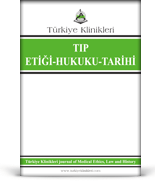As a citizen, we must take the responsibility of protecting ourselves from illness as well as preventing someone else from getting sick. In this study, we aimed to determine whether the behaviors exhibited in epidemic control change according to the inclination to the ethical values. In this cross-sectional study we reached 620 people over the age of 18 actively using their social media accounts. The data of the study were collected using the 'Introductory Information Form' created by the researchers, and 'The Inclination to Ethical Values Scale' in between October 23 and November in 2021. The mean age of participants was 28.56±10 were 77.7% female and 62.9%, were single participant 11.8% of the participants lived at home with an individual aged 65 or over and 14.2% of the participants had chronic illness. The rate of having a coronavirus disease-2019 (COVID-19) test was 25.2% and a positive rate of COVID-19 testing was 11.0%. The mean score of the participants' 'Behaviors for the control of the spread of COVID-19' was 4.46. The average score of the participants for 'The Inclination to Ethical Values Scale' was 4.38. There was an increase in score of 'Behaviors for the control of the spread of COVID-19' with the increase in score of 'The Inclination to Ethical Values Scale'. As a result of this study, in the contagious 'text-based case', those who felt responsible were more sensitive to controlling the spread of the infection.
Keywords: COVID-19; ethical values; inclination; ethical sensivity; control
Vatandaşlar olarak, kendimizi hastalıktan korumanın yanı sıra başka birinin hastalanmasını önleme sorumluluğunu da almalıyız. Bu çalışmada, salgın kontrolünde sergilenen davranışların etik değerlere eğilime göre değişip değişmediğinin belirlenmesi amaçlanmıştır. Kesitsel türde olan bu araştırmada, sosyal medya hesaplarını aktif olarak kullanan ve 18 yaş üstü olan 620 kişiye ulaşılmıştır. Araştırmanın verileri, araştırmacılar tarafından oluşturulan 'Tanıtıcı Bilgi Formu' ve 'Etik Değerlere Yatkınlık Ölçeği' kullanılarak 23 Ekim-Kasım 2021 tarihleri arasında toplanmıştır. Katılımcıların yaş ortalaması 28,56±10'dur. Kadın ve bekâr katılımcıların yüzdeleri sırasıyla %77,7 ve %62,9'dur. Katılımcıların %11,8'i evde 65 yaş ve üzeri bir bireyle yaşamaktadır ve katılımcıların %14,2'sinin kronik hastalığı mevcuttur. Koronavirüs hastalığı-2019 [coronavirus disease-2019 (COVID-19)] testi yaptırma oranı %25,2 ve pozitif COVID-19 testi olma oranı %11,0 olarak belirlenmiştir. Katılımcıların 'COVID-19 yayılmasının kontrolü için davranışlar' puan ortalaması 4,46'dır. 'Katılımcıların Etik Değerlere Eğilim Ölçeği'nden' aldıkları ortalama puan 4,38'dir. 'Etik Değerlere Yatkınlık Ölçeği' puanındaki artışla birlikte 'COVID-19 yayılımının kontrolüne ilişkin davranışlar' puanında artış olmuştur. Bu çalışmanın sonucunda, 'metin tabanlı vakada', kendilerini sorumlu hissedenlerin enfeksiyonun yayılmasını kontrol etme konusunda daha duyarlı oldukları ortaya çıkmıştır.
Anahtar Kelimeler: COVID-19; etik değerler; eğilim; etik duyarlılık; kontrol
- Zhao S, Lin Q, Ran J, Musa SS, Yang G, Wang W, et al. Preliminary estimation of the basic reproduction number of novel coronavirus (2019-nCoV) in China, from 2019 to 2020: A data-driven analysis in the early phase of the outbreak. Int J Infect Dis. 2020;92:214-7. [Crossref] [PubMed] [PMC]
- Cascella M, Rajnik M, Cuomo A, Dulebohn SC, Di Napoli R. Features, evaluation and treatment coronavirus (COVID-19). StatPearls (2020). [Link]
- Rothan HA, Byrareddy SN. The epidemiology and pathogenesis of coronavirus disease (COVID-19) outbreak. J Autoimmun. 2020;109:102433. [Crossref] [PubMed] [PMC]
- Köken A. Etik yönleriyle Coronavirüs (Covid 19) pandemisi. Ankara Barosu Sağlık Hukukunda COVID-19 Bülteni. Ankara Bar. 2020. Erişim tarihi: 03.01.2021. [Link]
- Cranston N, Ehrich L, Kimber M. The 'right' decision? Towards an understanding of ethical dilemmas for school leaders. Westminster Stud. Educ. 2003;26(2):135-47. [Crossref]
- Fritzsche DJ. A model of decision-making incorporating ethical values. J. Bus. Ethics. 1991;10(11):841-52. [Crossref]
- Stevens B. Communicating ethical values: A study of employee perceptions. J. Bus. Ethics. 1999;20:113-20. [Crossref]
- T. C. İ. B. Koronavirüs ile Mücadele Kapsamında - Yeni Kısıtlama ve Tedbirler Genelgeleri. 2020. Erişim Tarihi: 03.01.2021. [Link]
- Örnek Büken N. COVID-19 pandemisi ve etik konular [COVID 19 Pandemic and Ethical Issues]. Sağlık ve Toplum. 2020;15-26. [Crossref]
- Yalçınkaya E. Covid-19 ve getirdiği etik sorunlar [Covid-19 and the ethical problems it brings]. Turkish J. Bioeth. 2019;6(3):122-7. [Crossref]
- Ho A, Dascalu I. Relational solidarity and COVID-19: an ethical approach to disrupt the global health disparity pathway. Glob Bioeth. 2021;32(1):34-50. [Crossref] [PubMed] [PMC]
- Doung-ngern P, Suphanchaimat R, Panjangampatthana A, Janekrongtham C, Ruampoom D, Daochaeng N, et al. Associations between wearing masks, washing hands, and social distancing practices, and risk of COVID-19 infection in public: a cohort-based case-control study in Thailand. SSRN Electron. J. 2020;1-42. [Crossref]
- Türkiye Cumhuriyeti Sağlık Bakanlığı Halk Sağlığı Genel Müdürlüğü. COVID-19 Rehberi. 2020. Erişim tarihi: 03.01.2021. [Link]
- Kaya İ. Etik değerlere yatkınlık ölçeği: geçerlik ve güvenirlik çalışması [The study of validity and reliability: the inclination to ethical values scale]. Uluslararası Sos. Araştırmalar Derg. 2015;8(41):968-74. [Crossref]
- Eraslan L. Bireysel sosyal sorumluluk ölçeğinin (BSS) geliştirilmesi: geçerlik ve güvenirlik çalışması [Development of individual social responsibility scale (IRS): validity and reliability study]. Ölçeğinin Geliştirilmesi Geçerlik ve Güvenirlik Çalışması. 2011;24(7):81-92. [Link]
- Hatch CD, Stephen SA. Gender effects on perceptions of individual and corporate social responsibility. J. Appl. Bus. Econ. 2015;17(3):63-71. [Link]
- Mohammadpour M, Zarifinezhad E, Ghanbarzadegan A, Naderimanesh K, Shaarbafchizadeh N, Bastani P. Main factors affecting the readiness and responsiveness of healthcare systems during epidemic crises: a scoping review on cases of SARS, MERS, and COVID-19. Iran J Med Sci. 202;46(2):81-92. [PubMed] [PMC]
- Bostan S, Erdem R, Öztürk YE, Kılıç T, Yılmaz A. The effect of COVID-19 pandemic on the Turkish society. Electron. J. Gen. Med. 2020;17(6):em237. [Crossref]
- Uddin S, Imam T, Khushi M, Khan A, Ali M. How did socio-demographic status and personal attributes influence compliance to COVID-19 preventive behaviours during the early outbreak in Japan? Lessons for pandemic management. Pers Individ Dif. 2021;175:110692. [Crossref] [PubMed] [PMC]
- Muto K, Yamamoto I, Nagasu M, Tanaka M, Wada K. Japanese citizens' behavioral changes and preparedness against COVID-19: An online survey during the early phase of the pandemic. PLoS One. 2020; 15(6):e0234292. [Crossref] [PubMed] [PMC]
- Sun W, Zhou Y, Chen WT, Huang F, Sun M, Shen L, et al. Disclosure experience among COVID-19-confirmed patients in China: A qualitative study. J Clin Nurs. 2021;30(5-6):783-92. [Crossref] [PubMed] [PMC]







.: İşlem Listesi